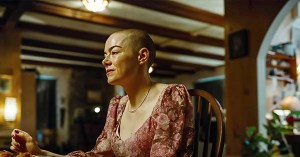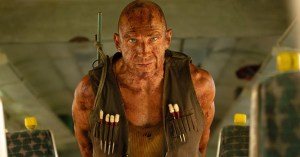Total Recall: Steve Buscemi’s Best Movies
We count down the best-reviewed work of the Incredible Burt Wonderstone star.
He hasn’t always played the nicest characters, but both onscreen and off, Steve Buscemi has always come across as a pretty interesting person — a gifted thespian, talented director, and former firefighter who helped clear rubble from the World Trade Center after 9/11, he’s one ubiquitous character actor whose Hollywood success doesn’t seem to have turned him into anything other than a regular guy from Brooklyn. Of course, in this weekend’s The Incredible Burt Wonderstone, he’s anything but regular… which is why we decided we couldn’t miss the opportunity to dedicate a list to some of Buscemi’s best-reviewed roles. It’s time for Total Recall!
10. Living in Oblivion
Allegedly inspired by writer/director Tom DiCillo’s less-than-wonderful experiences on the set of the early Brad Pitt picture Johnny Suede, 1995’s Living in Oblivion starred Buscemi as a put-upon director whose struggles with his emotionally distraught crew (including Dermot Mulroney as the director of photography) and exasperating cast (including Catherine Keener as his difficult leading lady and James LeGros as the buffoonish, possibly Pitt-derived leading man) make it difficult for him — and the audience — to keep track of what’s illusory and what’s real. “So you wanna make a movie?” asked the Washington Post’s Hal Hinson. “Well, first, you should see Living in Oblivion, Tom DiCillo’s savagely funny satire of the world of independent filmmaking.”
9. Mystery Train
Buscemi picked up his first Independent Spirit Award nomination for his supporting work in this Jim Jarmusch anthology film consisting of three loosely connected stories — one of which found Buscemi sharing screen time with Joe Strummer, Screamin’ Jay Hawkins, and the decade’s most in-depth discussion of Lost in Space not involving Matt LeBlanc. “The three-part structure of Mystery Train is still a bit shambling and slight,” admitted Entertainment Weekly’s Chris Nashawaty, “but there’s an undeniable air of deadpan cool that permeates the film and gives it a haunting sense of place.”
8. The Messenger
One on a growing list of 21st century films about American war that American audiences have largely ignored, 2009’s The Messenger takes the mounting costs of our conflicts and gives them unforgettably human faces — including Will Montgomery and Tony Stone (played by Ben Foster and Woody Harrelson, who received a Best Supporting Actor Oscar nomination) as soldiers tasked with delivering casualty notifications to survivors, and Steve Buscemi as a father whose awful grief helps lend the film its gut-punching power before giving it an unexpected twist. “This is a wholly different look at the fallout of the Iraq War and its effect on soldiers and civilians,” offered USA Today’s Claudia Puig. “It is also a gentle portrait of grief, friendship and solace.”
7. Barton Fink
Generally speaking, we tend to avoid including cameos and smallish roles in these lists, but those rules are bent when it comes to actors like Buscemi, who can steal an entire movie with little more than a few moments on the screen. One of his more memorable minor parts: Chet the bellhop in Barton Fink, a barely-seen character whose friendliness to Fink (John Turturro) adds a bit of light to an oft-gloomy Coen brothers picture that uses the uneasy partnership between art and commerce as a backdrop for a surreal drama about sex, lies, and a shotgun-toting John Goodman. Calling the end result “Gnomic, claustrophobic, hallucinatory, just plain weird,” Time’s Richard Schickel lauded it as “the kind of movie critics can soak up thousands of words analyzing and cinephiles can soak up at least three espressos arguing their way through.”
6. Miller’s Crossing
The gangster drama whose stubborn script eventually prompted the desperate break that birthed Barton Fink, Miller’s Crossing blended well-worn genre formula with the Coen brothers’ signature style — and gave Steve Buscemi an early break with the brief but pivotal role of Mink Larouie, a bookie whose illicit affairs draw him into a gang war that proves deadly (giving the Coens the first of many opportunities to cause Buscemi’s on-screen death). “While Miller’s Crossing is not as messy or inspired as Martin Scorsese’s GoodFellas, or as richly suggestive as The Godfather, it accomplishes exactly what it sets out to do,” mused John Hartl for Film.com.
5. In the Soup
1992 was really Buscemi’s year at Sundance — not only did he make a big splash as part of Quentin Tarantino’s Reservoir Dogs, but he was also an integral part of Alexandre Rockwell’s highly regarded In the Soup, an offbeat low-budget dramedy about a struggling screenwriter (Buscemi) who desperately teams up with a con man (Seymour Cassel) in order to find financial backing for his meandering 500-page script. Unfortunately overshadowed by some of the higher-profile festival favorites of the year, Soup remained a critical favorite for writers like Combustible Celluloid’s Jeffrey M. Anderson, who admitted, “Yes, it’s an old story that has been told a thousand times before and since, but Alexandre Rockwell’s little film has a home movie charm and a streetwise wit that make it a must-see sleeper.”
4. Ghost World
Buscemi’s ability to imbue even the most unlikable characters with some shred of humanity (think Garland Green in Con Air) has made him a favorite for directors who need someone to play a multi-dimensional cretin. A notable exception: Terry Zwigoff’s Ghost World, a bleakly funny adaptation of the Daniel Clowes comic book about a pair of teenage misfits (Scarlett Johansson and Thora Birch) whose casually mean-spirited prank on a lonely middle-aged man (Buscemi) has unforeseen consequences on their friendship. A cult and critical favorite, Ghost World resonated with scribes like Angie Errigo of Empire, who wrote, “This is ‘teen comedy’ of startling sophistication — with horribly funny bits as well. A true original, with sharp humour, subtle detail and painfully realistic characters.”
3. Fargo
After filming small-but-pivotal parts in the Coen brothers’ Miller’s Crossing and Barton Fink, Buscemi was rewarded with a role written specifically for him in their 1996 breakthrough, Fargo. A seven-time Academy Award nominee (and two-time winner) that now resides in the National Film Registry, it tells the increasingly unpleasant tale of a car dealership manager (William H. Macy) who tries to get out from under his financial woes by hiring a pair of small-time crooks (Buscemi and Peter Stormare) to kidnap his wife so he can fool his wealthy father-in-law into paying the ransom. A grisly comedy of errors ensues, with the kidnappers leaving a trail of death in their wake and a tenacious cop (Frances McDormand) in hot pursuit. “To watch it is to experience steadily mounting delight,” smiled Roger Ebert, “as you realize the filmmakers have taken enormous risks, gotten away with them and made a movie that is completely original, and as familiar as an old shoe.”
2. Reservoir Dogs
A heist movie without the heist — but with a far sharper (as well as gorier and more profane) script than most movies of its kind, Quentin Tarantino’s Reservoir Dogs helped kick off the indie film boom of the 1990s with a tightly wound, beautifully cast look at what happens when a group of really bad guys try to pull off a big score and it all goes wrong. Working with a scarily talented group of character actors, Tarantino — who was making his feature debut — made it count by giving Harvey Keitel, Tim Roth, Michael Madsen, Chris Penn, and Buscemi (as the weaselly Mr. Pink, a role Tarantino originally planned to take for himself) some of the most memorable scenes of their careers. “It’s unclear whether this macho thriller does anything to improve the state of the world or our understanding of it,” admitted the Chicago Reader’s Jonathan Rosenbaum, “but it certainly sets off enough rockets to hold and shake us for every one of its 99 minutes.”
1. Monsters, Inc.
It’s always a bit of a disappointment when an animated film ends up at the top of an actor’s Total Recall list — and we know more than a few of you think voice roles shouldn’t count at all — but if it has to happen, then it might as well be a movie as wonderful as Monsters, Inc. Starting from a rich premise (what if the monsters in your kid’s closet are real…and they’re scared too?), Pixar’s fourth feature used its universal concept as the framework for a thoughtful, ecologically conscious rumination on the journey from childhood to adulthood. Plus, it was exciting and really funny, thanks to a stellar voice cast that included Billy Crystal and John Goodman (as monster pals Mike and Sulley), James Coburn, Jennifer Tilly, and (of course) Steve Buscemi as the nasty monster Randall Boggs. It all added up to a massive box office hit — and a movie that, in the words of Melanie McFarland of the Seattle Times, acts as “A marvelous combination of lollipop visuals, brilliant screenwriting, sharp comedic timing and, above all, overflowing amounts of heart.”
In case you were wondering, here are Buscemi’s top 10 movies according to RT users’ scores:
1. Reservoir Dogs — 93%
2. The Big Lebowski — 93%
3. Fargo — 91%
4. Miller’s Crossing — 88%
5. Barton Fink — 87%
6. Mystery Train — 86%
7. Monsters, Inc. — 84%
8. Living in Oblivion — 84%
9. Ghost World — 80%
10. Desperado — 79%
Take a look through Buscemi’s complete filmography, as well as the rest of our Total Recall archives. And don’t forget to check out the reviews for The Incredible Burt Wonderstone.






